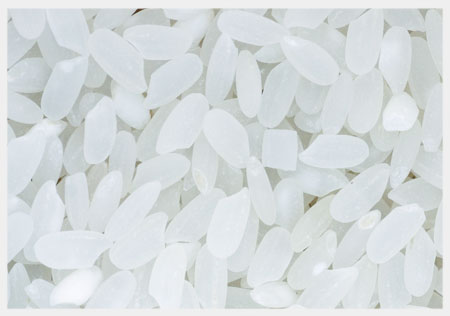
ABOUT RICE
Rice is unique among cereal grains in that the entire polished grain is eaten while other cereals are usually processed before they reach the consumer. Grain quality in rice is, therefore, a very sensitive issue. Interests and priorities of different sectors of rice industry are different. Farmers are interested in early maturity and high yield that would give them high returns in the form of good produce and provide enough time for sowing
subsequent crops including wheat. Miller’s interest is high head rice recovery. Traders prefer attractive physical appearance (shape and size), whiteness and uniform grain size.
Rice has always been the staple food of the Thai people, and it plays a crucial role as the essence of Thai life. Farmers transfer the knowledge of rice cultivation from one generation to the next. They enjoy a rich culture with centuries-old traditions linked with rice farming.
Long Grain Rice
Long grain rice has a long and slender kernel. It is four to five times longer than its width. After cooking, the grains stay separate and fluffy.
Long grain rice is your best choice if you want to serve rice as a side dish or as “a bed” for sauces – or dishes made with sauces.
Medium Grain Rice
Medium grain rice has a shorter and wider kernel. It is two to three times longer than its width. After cooking, the grains are more moist and tender than long grain rice. They also have more of a tendency to cling together.
Medium grain rice is a good choice for paellas and risottos.
Short Grain Rice
Short grain rice has a short, plump and almost round kernel. After cooking, the grains are soft and stick together.
Short grain rice is your best choice for rice pudding and molded salads.
Nutritional benefits of rice
- Rice is an excellent source of energy. It is rich in carbohydrates, which are broken down into glucose to provide energy for working muscles and fuel for the brain.
- Rice is low in sugar and total fat and saturated fat. It is cholesterol-free, contains negligible amounts of salt and has no additives or preservatives. It is suitable to include in a diet for those watching their weight or on cholesterol-lowering diets.
- Rice is gluten-free, making it ideal for people who are unable to tolerate the proteins found in wheat, barley, rye, oats and triticale.
- The glycaemic index (GI) ranks foods based on their immediate effect on blood sugar levels. Eating low GI foods, such as certain varieties of rice, can lower insulin levels which makes fat easier to burn and less likely to be stored.